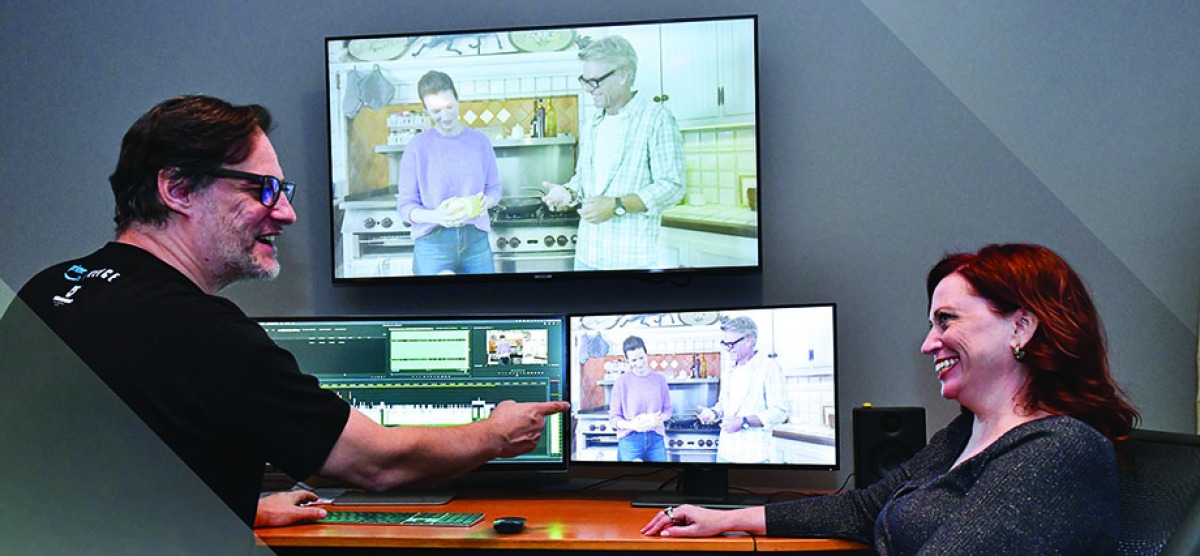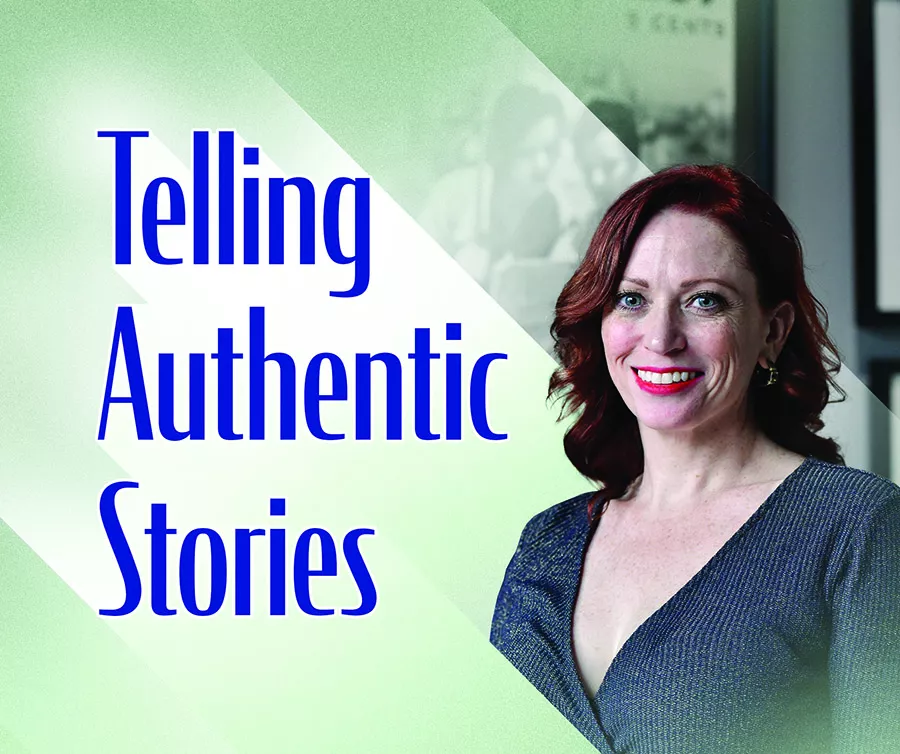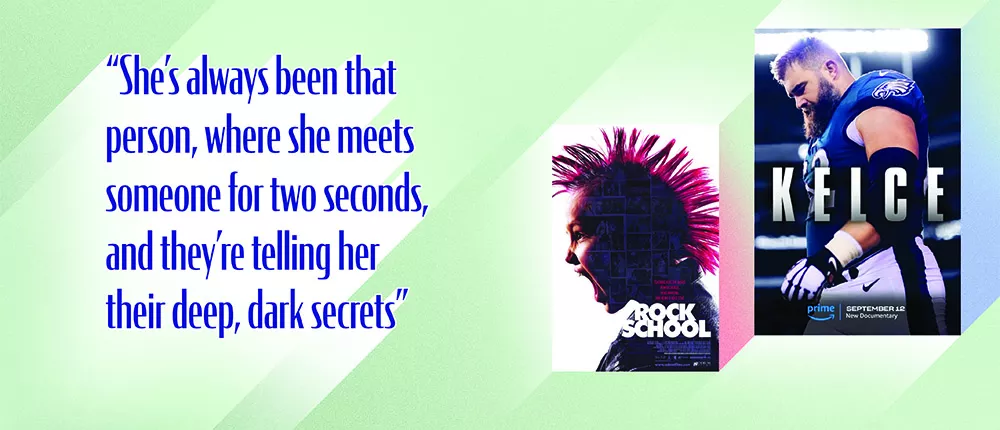
Telling Authentic Stories
Sheena Joyce '98 has mastered the art of the must-watch documentary.
While interviewing Philadelphia Eagles center Jason Kelce for an eponymous documentary, producer Sheena M. Joyce '98 got the tough, trash-talking big guy all emotional on camera, revealing a side not often seen.
It shouldn’t surprise. That’s Joyce’s MO, by all accounts. In 20 years of primarily making documentaries, the 47-year-old Bryn Mawr College English major—and the Philadelphia-based 9.14 Pictures production company she co-owns with business and life partner Don Argott, 51—have built a reputation for revealing the humanity of their varied subjects.
That includes a Le Cordon Bleu–trained chef who divulges the rough start when she left home at 17 (In the Kitchen with Harry Hamlin); a larger-bodied burlesque dancer who shares how her mother “broke her” self-confidence as a child over her weight (Thick Skin); and the football player who tears up while recounting that day in 2018 when Philly threw its winning Super Bowl team a parade (Kelce). This last film, which follows Kelce as he weighs retirement even as the underdog Eagles head to Super Bowl LVII, is the most-watched documentary ever on Amazon’s Prime Video in the United States, debuting at No. 1 in 2023 and raising 9.14 Pictures’ profile.
“We love telling intimate, personal stories, many of which seem hidden in plain sight,” she says.“It’s all about the story and the characters.”
It’s also about Joyce and her ability to build the trust that gets those characters to share their real selves in front of cameras. The 5-foot-1, red-headed dynamo with an infectious laugh comes across as the down-to-earth, ever-personable gal next door, even in the glittery gold Louboutin spike heels that she walks around in on this November day at the Callowhill office in a nondescript building.
As Renee Guilbault, the classically trained chef and Harry Hamlin’s niece, puts it: A Joyce interview is like “a fireside chat with your bestie, minus the alcohol.” At the shoot, Argott worked the camera, while Joyce asked questions and held court behind the video monitor, suggesting shots as Hamlin and his niece cooked for family and friends at his Beverly Hills house. The In the Kitchen with Harry Hamlin Christmas special aired in December 2023 and will continue as a five-part series later this year on cable channel IFC.
“I didn’t feel like I was on a stage,” Guilbault says, “or doing anything other than being barefoot in Uncle Harry’s kitchen.”
Hamlin agrees. “You laugh,” he says of the special that boiled down 20-plus hours of footage to a 22-minute story of family and food. “You cry. You learn something about food. How not to cut an onion.” This last comment refers to a segment where Hamlin’s less-than-masterful hacking is captured in a close-up, earning a shake of the head from the chef—the kind of unrehearsed, funny moment that imbues much of the company's productions.
That authenticity also comes through in last year’s docuseries Thick Skin, says Katherine Dore, vice president of creative for AMC Networks. “I think Sheena shows her own vulnerability in a very real way,” she says, recalling how Joyce shared stories of her own family members’ struggles with obesity with the subjects, “and so people think they can open up with her….We were all blown away over how honest people were. That's really a testament to her interview skills."
The Representation Project, a gender watchdog group, touted the production as “a must-watch for the powerful insights and storytelling.”
Dore says Joyce’s successes stem from a rare combination of compassion and curiosity, with a good measure of humor, that play to her vérité style of interviewing.
In one telling scene, a young boy and his mother are unpacking groceries, when he tells her that if she eats all that cabbage, then she's going to be chunky.”
“Oh, there’s nothing wrong with chunky, honey,” the mother says, even as the child persists.
Argott ascribes his “other half’s” ability to peel away the armor to something innate. “She’s always been that person, where she meets someone for two seconds, and they’re telling her their deep, dark secrets, he says. "It's who she is as a person."
For her part, Joyce gives a good share of credit to Bryn Mawr. "It's amazing how much a liberal arts education will serve you later in life," she says of her studies, "knowing a little bit about a lot of things. I think that Bryn Mawr taught me how to write, ...how to think more critically. Both help me in how I conduct interviews and craft questions and approach subjects."
At first, though, the younger daughter of a middle school English teacher dad and AstraZeneca data coordinator mom found Bryn Mawr a world apart from growing up in working-class Aston, Pa. "I was overwhelmed by feeling small in comparison to my classmates," says the former work-study student. "I didn't have the international experience, a lot of the social experience that some of my peers had. I felt a bit out of my league."
That quickly changed as she made friends––several lifelong––and interned at local television stations, getting a taste of broadcast journalism, especially the production side. "Bryn Mawr helped me find my voice," she says.
Soon after graduating, Joyce landed at the Greater Philadelphia Film Office as assistant to executive director Sharon Pinkenson. It was a behind-the-scenes deep dive into production that cemented her interest in film and first introduced her to Argott, who had a production company with another business partner. When that partner wanted to move to L.A., Argott decided to stay in Philadelphia, forming 9.14 Pictures. By then, he and Joyce were living together and would eventually have a daughter, Maeve, now 10.
“Every night, he’d come home and talk about a new project,” she says. “I’d look at footage that he’d bring back to the house. I’d write questions for his interviews the next day. I’d go on shoots with him.”
“We complemented each other,” Argott says. Joyce left the film office to join 9.14 Pictures. From the get-go, she was the people person, Argott adds, maintaining relationships over the couple of years it can take to make a film and beyond.
“There are lots of Christmas cards we get from past subjects,” she says.
How is it to work so closely with your life partner?
“I’ve said many times, ‘It’s a beautiful nightmare,’” Joyce says. “We have all kinds of disagreements on how things should get done, who should take the lead on something, how scenes should get cut in the edit room, everything. But in the end, I feel like it makes a better product.”
Argott agrees: “We’re both strong-willed people and we both want what we want. At the same time, you have to find common ground.”
For Joyce, much of her confidence stems from her college years. “I learned to trust myself more,” she says. “I learned how to be voraciously inquisitive. I learned I can move in circles and rooms that may not be my own and still be comfortable in them.”
It shows in the company’s filmography. In 2005, Rock School, the pair’s first feature-length documentary about a group of unlikely would-be rock star adolescents, debuted to rave reviews. Since then, they’ve tackled it all, it seems. Sports. Obesity. Home-cooking. Nuclear reactors (The Atomic States of America, 2012). True crime (Spector, 2022). And more. In 2009, The Art of the Steal, about the Barnes Foundation’s controversial move, landed on Roger Ebert’s list of best docs. The 2018 Believer, about Mormon rock star Dan Reynolds of Imagine Dragons taking on the Church of Latter Day Saints over LGBTQ+ rights, opened at Sundance.
“You never know with whom or where you’ll be from one project to the next,” she says. “We’ve tried very hard not to be pigeon-holed…. The common theme is a good story with incredible access, to tell someone's story as authentically as possible.”
Published on: 03/20/2024

